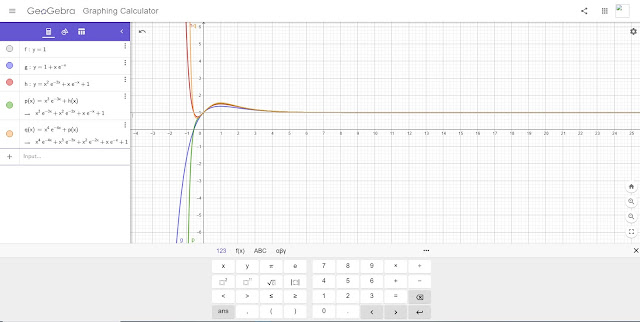HP Prime and Casio fx-CG50 MicroPython: √(x + √(x + √(x + ... )))
Introduction
 |
| Made with LibreOffice Math |
The program SQRADD attempts to find a calculation to:
√(x + √(x + √(x + ... )))
That is:
1. Start with a number x (any positive number, we're assuming that we are in the Real Number domain)
2. Take the square root
3. Add x to the result
4. Take the square root of the result
5. Repeat steps 3 and 4 forever. (or until a condition is satisfied, such as machine accuracy is reached)
HP Prime Program SQRADD
The loop repeats until the difference between two terms is less than machine accuracy, 1E-12 (since HP Prime has floating point accuracy of 12 digits). Output: {x, answer, number of iterations it took to get machine accuracy}
EXPORT SQRADD(X)
BEGIN
// 2019-04-28 EWS
// √(X+√(X+√(X+...)))
// setup
LOCAL T,U,N:=1;
T:=√X;
U:=√(X+T);
// loop
WHILE ABS(U-T)≥1E−12 DO
T:=U;
U:=√(X+T);
N:=N+1;
END;
// display results {X,U,N}
RETURN {X,U,N};
END;
Casio fx-CG50 MicroPython Script sqradd.py
Use the Python mode of the Casio fx-CG50 (software versions 3.2 or greater). For more information of this procedure, please see:
http://edspi31415.blogspot.com/2018/10/casio-fx-cg50-version-320-python-comes.html
# 2019-04-28 EWS
import math
# sqrt(X+sqrt(X+...))
# declare variables
# as float
N=1.0
X=float(input("X="))
T=float(math.sqrt(X))
U=float(math.sqrt(X+T))
# loop
# Casio Micropython
# has precision of 15
while abs(U-T)>=1e-15:
T=U
U=math.sqrt(X+T)
N+=1
# results
print("X= "+str(X))
print("Result= ")
print(str(U))
print("Iterations= "+str(N))
Procedure on a Four-Function or Desktop Calculator
1. Clear the memory (usually [ MRC ] [ MRC ] )
2. Enter x and store it in memory (x [ M+ ] )
3. Take the square root [ √ ]
4. Repeat this loop (until machine accuracy is reached, that is, the the result doesn't "change"): [ + ] [ MR ] [ = ] [ √ ]
Results
HP Prime
x = 1, Result: 1.61803398875, 23 iterations
x = 2, Result: 2, 20 iterations
x = 3, Result: 2.30277563773, 18 iterations
x = 4, Result: 2.56155281281, 17 iterations
x = 5, Result: 2.79128784748, 17 iterations
x = 6, Result: 3, 16 iterations
x = 7, Result: 3.19258240357, 16 iterations
x = 8, Result: 3.37228132327, 15 iterations
x = 9, Result: 3.54138126514, 14 iterations
x = 10, Result: 3.70156211871, 14 iterations
x = 11, Result: 3.85410196624, 13 iterations
x = 12, Result: 4, 14 iterations
x = 20, Result: 5, 12 iterations
x = 30, Result: 6, 12 iterations
x = 42, Result: 7, 11 iterations
x = 56, Result: 8, 11 iterations
Casio fx-CG50 MicroPython
x = 1, Result: 1.618033988749895, 30 iterations
x = 2, Result: 2, 26 iterations
x = 3, Result: 2.302775637731994, 24 iterations
x = 4, Result: 2.56155281280883, 22 iterations
x = 5, Result: 2.79128784747792, 21 iterations
x = 6, Result: 3, 20 iterations
x = 7, Result: 3.192582403567252, 20 iterations
x = 8, Result: 3.372281323269014, 19 iterations
x = 9, Result: 3.54138126514911, 19 iterations
x = 10, Result: 3.701562118716424, 18 iterations
x = 11, Result: 3.854101966249685, 18 iterations
x = 12, Result: 4, 18 iterations
x = 20, Result: 5, 16 iterations
x = 30, Result: 6, 15 iterations
x = 42, Result: 7, 14 iterations
x = 56, Result: 8, 14 iterations
Some Interesting Observations
When x = 1, the result is the Golden Ratio, Φ = (1 + √5)/2.
When x = n * (n-1) where n is an integer and n ≥ 2, the result is n.
Examples:
x = 2 = 2 * 1, result: 2
x = 12 = 4 * 3, result: 4
x = 56 = 8 * 7, result: 8
x = 240 = 16 * 15, result: 16
x = 992 = 32 * 31, result: 32
Fun stuff. What other patterns can we find with this or other similar calculation? Until next time,
Eddie
All original content copyright, © 2011-2019. Edward Shore. Unauthorized use and/or unauthorized distribution for commercial purposes without express and written permission from the author is strictly prohibited. This blog entry may be distributed for noncommercial purposes, provided that full credit is given to the author.






